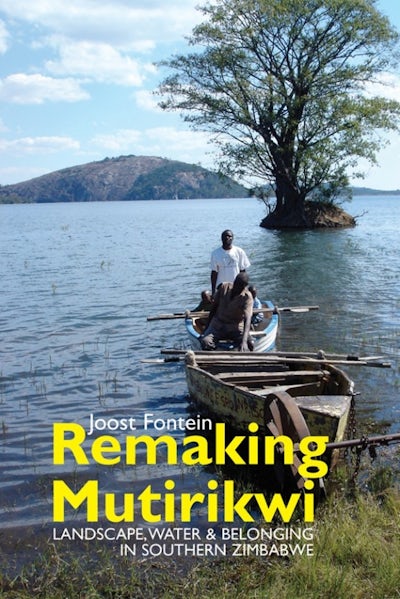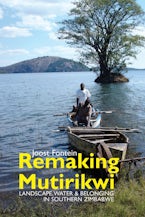
Title Details
360 Pages
23.4 x 15.6 cm
16 b/w, 3 line illus.
Series: Eastern Africa Series
Series Vol. Number:
25
Imprint: James Currey
Remaking Mutirikwi (African Edition)
Landscape, Water and Belonging in Southern Zimbabwe
- Description
- Contents
- Author
- Reviews
PAPERBACK FOR SALE IN AFRICA ONLY
Finalist for the ASA 2016 Melville J. Herskovits Award
A detailed ethnographic and historical study of the implications of fast-track land reform in Zimbabwe from the perspective of those involved in land occupations around Lake Mutirikwi, from the colonial period to the present day.
The Mutirikwi river was dammed in the early 1960s to make Zimbabwe's second largest lake. This was a key moment in the "Europeanisation" of Mutirikwi's landscapes, which had begun with colonial land appropriations in the 1890s. But African landscapes were not obliterated by the dam. They remained active and affective. At independence in 1980, local clans reasserted ancestral land claims in a wave of squatting around Lake Mutirikwi. They were soon evicted as the new government asserted control over the remaking of Mutirikwi's landscapes. Amid fast-track land reform in the 2000s, the same people returned again to reclaim the land. Many returned to the graves and ruins of past lives forged in the very substance of the soil, and even incoming war veterans and "new farmers" appealed to "autochthonous knowledge" to "make safe" their resettlements.
This book explores those reoccupations and the complex contests over landscape, water and belonging they provoked. The 2000s may have heralded a long-delayed "re-Africanisation" of Lake Mutirikwi, but just as African presence had survived the dam, so "white" presence remains active and affective through Rhodesian-era discourses, place-names and the materialities of ruined farms, contour ridging and old irrigation schemes.
Through lenses focused on the political materialities of water and land, this book reveals how the remaking of Mutirikwi's landscapes has always been deeply entangled with changing strategies of colonial and postcolonial statecraft. It highlights how the traces of different pasts intertwine in contemporary politics through the active, enduring yet emergent, forms and substances of landscape.
Joost Fontein is Director of the British Institute in Eastern Africa and Lecturer in Social Anthropology at the University of Edinburgh.
Published in association with the British Institute in Eastern Africa.
Finalist for the ASA 2016 Melville J. Herskovits Award
A detailed ethnographic and historical study of the implications of fast-track land reform in Zimbabwe from the perspective of those involved in land occupations around Lake Mutirikwi, from the colonial period to the present day.
The Mutirikwi river was dammed in the early 1960s to make Zimbabwe's second largest lake. This was a key moment in the "Europeanisation" of Mutirikwi's landscapes, which had begun with colonial land appropriations in the 1890s. But African landscapes were not obliterated by the dam. They remained active and affective. At independence in 1980, local clans reasserted ancestral land claims in a wave of squatting around Lake Mutirikwi. They were soon evicted as the new government asserted control over the remaking of Mutirikwi's landscapes. Amid fast-track land reform in the 2000s, the same people returned again to reclaim the land. Many returned to the graves and ruins of past lives forged in the very substance of the soil, and even incoming war veterans and "new farmers" appealed to "autochthonous knowledge" to "make safe" their resettlements.
This book explores those reoccupations and the complex contests over landscape, water and belonging they provoked. The 2000s may have heralded a long-delayed "re-Africanisation" of Lake Mutirikwi, but just as African presence had survived the dam, so "white" presence remains active and affective through Rhodesian-era discourses, place-names and the materialities of ruined farms, contour ridging and old irrigation schemes.
Through lenses focused on the political materialities of water and land, this book reveals how the remaking of Mutirikwi's landscapes has always been deeply entangled with changing strategies of colonial and postcolonial statecraft. It highlights how the traces of different pasts intertwine in contemporary politics through the active, enduring yet emergent, forms and substances of landscape.
Joost Fontein is Director of the British Institute in Eastern Africa and Lecturer in Social Anthropology at the University of Edinburgh.
Published in association with the British Institute in Eastern Africa.
Remaking Mutirikwi: An Introduction - PART ONE: Remaking Mutirikwi in the 2000s
New farmers, old claims
Graves, ruins & belonging
Rain, power & sovereignty
Hippos, fishing & irrigation
Genealogical Geographies - PART TWO: Damming Mutirikwi, 1940s-1990s
New white futures, new Rhodesian settlers & large-scale irrigation, 1940s - 1950s
Remaking Victorian Landscapes, 1950s-1960s
War & danger in the wake of the dam, 1970s
Promised returns & frustrated futures in the wake of war, 1980s-1990s
Epilogue: Remaking Mutirikwi in the late 2000s and early 2010s
New farmers, old claims
Graves, ruins & belonging
Rain, power & sovereignty
Hippos, fishing & irrigation
Genealogical Geographies - PART TWO: Damming Mutirikwi, 1940s-1990s
New white futures, new Rhodesian settlers & large-scale irrigation, 1940s - 1950s
Remaking Victorian Landscapes, 1950s-1960s
War & danger in the wake of the dam, 1970s
Promised returns & frustrated futures in the wake of war, 1980s-1990s
Epilogue: Remaking Mutirikwi in the late 2000s and early 2010s
"Fontein's interdisciplinary approach as an anthropologist, a sociologist, an ecologist, and a historian provides further credence to his writings.Fontein may have opened the door for a whole new understanding of peoples and places." AFRICAN AFFAIRS
"Highly recommended, both for those interested in detailed analyses of (the impact of) land reform in Zimbabwe, as well as those interested in more theoretical debates about the significance of materialities in anthropology and history." ANTHROPOLOGY SOUTHERN AFRICA
"This is a story of a tangle of imminent pasts and imagined futures firmly rooted in the substances of Mutirikwi . many audiences . will want to journey through the pasts and futures of this book." IJAHS
"T]his handsome volume helps readers to wrestle with the complexities of matter, experience, and time in southern Africa. Fontein's scholarship will interest students of African Studies, landscape, African history and historiography, materiality, development studies, and critical heritage studies." JOURNAL OF AFRICAN ARCHAEOLOGY
"Basing his book on extensive fieldwork, in-depth oral interviews, and an intimate understanding of the historical and social context, Fontein provides an exceptionally detailed analysis. . . . The moving stories of informants, vivid photos, and helpful maps make for an excellent work. Highly recommended." CHOICE
Title Details
360 Pages
2.34 x 1.56 cm
16 b/w, 3 line illus.
Series: Eastern Africa Series
Series Vol. Number:
25
Imprint: James Currey





















